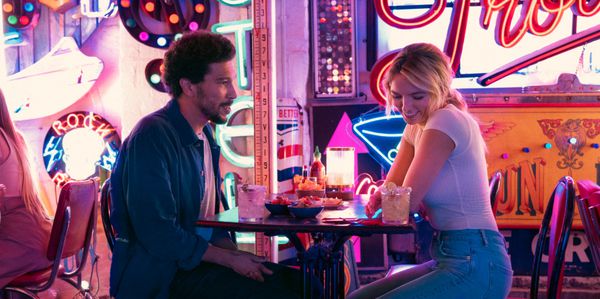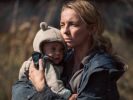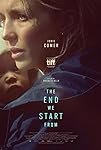Eye For Film >> Movies >> The End We Start From (2023) Film Review

The End We Start From has unfortunately been marketed as a disaster movie. A new mother's odyssey from sunken London, through the chaos of flooded England, to track down her lost husband. Baby in tow, she battles valiantly to ... That's not really this film. Justifiably, some people who have seen it have been quite disappointed. They were expecting action and adventure, a ripping yarn of epic proportions. What they got was a natural disaster as a metaphor for childbirth and early motherhood.
Jodie Comer's character, Woman, is in the late stages of pregnancy. She is at home alone, just pottering about the house. It starts to rain and then flood. As the water comes in under her door she goes into labour. As she gives birth at the hospital her house is inundated by the deluge. The imagery is laid on pretty heavy handedly. The juxtaposition of birth and torrent is a statement of artistic intent that the rest of the film doesn't live up to. Her husband R, played by Joel Fry, eventually makes it to the hospital. Reunited, they name their newborn Zeb. Throughout the film, Zeb is the only character that is ever referred to by name. The trio escape submerged London for R's parents'. N and G, played by Mark Strong and Nina Sosanya, have a large country house which is situated on high ground. It should be a place of safety.

During this time, the people who should be there to support Woman are stripped away from her and eventually replaced by others who are driven by their own agendas or ideologies. This isn't just analogous to what happens in early parenthood where people are there at the beginning, for the exciting part, but end up drifting away. It is also familiar to many people who have found themselves having acquiring care responsibilities or serious chronic health problems.
Lying behind it all is the flood. It is ominous, ever present, an event after which everything changes: life can never be the same again. The colour palette is dull, washed out and green. We are forced into tunnels by dark dead space, a somewhat clumsily used metaphor for the birth canal and the isolation of Woman's journey. Sometimes Comer's character is centre framed against an unpopulated background to suggest loneliness. In a short film where ideas have to be conveyed quickly, this use of imagery can be effective. In a feature, a more subtle approach my be more appropriate.
What could counterpoint the maladroit cinematic language is the depiction of the flood. In Melancholia, another film that was somewhat mis-sold as a disaster movie, the threat from the giant planet is omnipresent, a planet killer of catastrophic thought casting its gloomy green shadows of depression. In The End We Start From we never really see the flood or the damage that it has caused. Characters mention it and we see some of its side effects but there is little direct evidence of it. It is disaster by implication and hearsay.
The End We Start From never really addresses the reality of flooding. It seems to have been made by people who have little experience of it. It is cold, tiring. Everything is sodden and weighs twice as much it should. Your hands are chapped and burning. Your feet are blocks of ice and you don't know what you're treading on. The electrics are shorted out so you're in darkness. You try to save your precious things. Everything is manky, everything smells. The smallest sounds put you on edge. Putting things right again will take months and it will cost. On a larger level England is running out of food but has no problem with the supply of petrol and cigarettes. The film also has a particularly privileged gaze. The characters with meaningful speaking parts are all from an affluent professional background. They all have an ingrained sense of entitlement.
The End We Start From has a good crop of actors. Jodie Comer handles the lead role well; her physical acting as a pregnant woman and her infatuation with the baby are highly believable. As a new father unable to cope with the catastrophic situation he finds himself in, Joel Fry demonstrates an ability to play suffering that is exactly what the film needs. The rest of the cast, from Mark Strong and Nina Sosanya to Katherine Waterston as Woman's newfound friend O (maybe not the best thought through character name), to Benedict Cumberbatch's cameo as AB, provide great support.
If you take it for what it is rather than what it was marketed as, The End We Start From is an interesting watch. It is Woman's emotional odyssey, not her physical one. It has good and bad points. The good is crammed together in what feels like a number of short films or set pieces. The bad is the sparse interludes that, in repetition, don't add anything to the film. There is between 10 and 20 minutes that should have been pruned from the whole.
Reviewed on: 05 May 2024
















